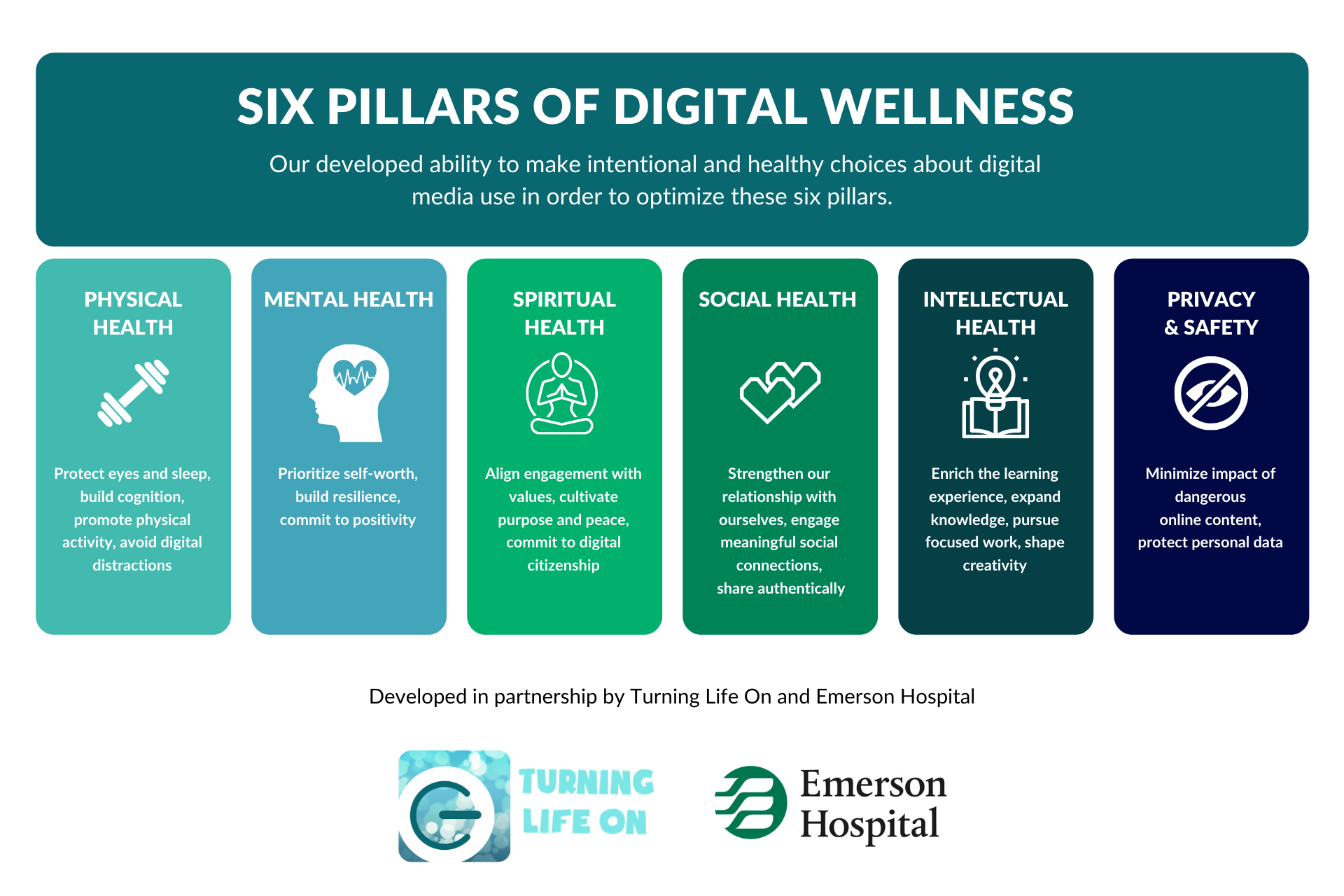Digital Wellness at a Glance
Mental Health
Digital media use can have both positive and negative impacts on mental health. Literature reviews show an increase in mental health disorders since widespread use of the smartphone and at least a correlation between social media use and these disorders1,2. This is because digital media use can cause fear, anxiety, depression and lack of emotional-regulation skills3.
Physical Health
The impacts of digital media use on physical health are vast. Digital media use can impact our posture, our sleep, our eyes, even the way our brain works. Our eyes are negatively affected by blue light exposure from devices, which can cause myopia and also impacts sleep. Digital media use is displacing physical activity, which is associated with obesity, cardiovascular disease and cancer. Digital media use can overload our brains with too much information, which can negatively impact our ability to process that information and store it in our long term memory. Concern is mounting over the connection between wireless radiation and the long term impacts on physical health. Choosing to use digital media during specific times of the day, for limited amounts of time, and in specific ways can help us avoid the negative impacts to our physical health.
Spiritual Health
In an always-on, always-connected world, many of us struggle to find purpose, peace and meaning in our lives. Digital media is interfering with our ability to be alone, which is essential to developing deeper thinking, self reflection and mental clarity. This is mainly because digital media creates too much noise, leading to confusion, stress and loss of self-direction. We are so busy managing the noise, we are no longer “in the lead.” We can use technology with intentionality and agency to better balance our online and offline lives. We can take breaks from technology to get in touch with the world right here, right now, and we can use technology to engage in appropriate social activism. According to the World Health Organization, spiritual health is finding gratitude in one’s circumstances, consciously exploring the meaning of life and connecting with oneself, others and nature. When we are tech-intentional, we use technology to our advantage, we support our spiritual health and well-being, and we achieve digital wellness.
Social Health
The strength of our relationships with others is based on our relationship with ourselves. And we need to spend time listening to our inner thoughts, and developing our values and opinions to better understand and accept who we are. Psychoanalyst Erik Erikson, a specialist in adolescent development, wrote that children need stillness in order to develop their identities. Once we know who we are, we can share ourselves with others, and learn from others, further developing our capacity for relationships. When it comes time to develop relationships with others, research reveals that the mere presence of a smartphone negatively affects closeness, connection and conversation quality. The current generation is growing up connected to mobile devices, but emotionally disconnected, which is impacting empathy. Conversation, which requires practice, is also useful throughout life in developing relationships and securing our place in society. We are highly social beings, and our happiness and health depend on feeling socially connected4. Something that can only be done through “artless, risky, and face-to-face” conversation.
Intellectual Health
There are many ways in which technology is being implemented in the classroom to enrich the learning experience and expand knowledge. TedTalks, access to information, and connection with scholars from across the globe help teachers expand lessons with meaningful and engaging content. In addition to these benefits, the presence of digital media and ways in which it is used can negatively impact acknowledge acquisition. Digital distraction and the presence of digital devices, even when not used, negatively impact test scores and overall grades. Writing by hand improves memory formation, working memory, letter recruitment and reading acquisition, idea creation, understanding of information and word recall as compared to typing. In addition to the benefits of writing over typing, research also shows that reading text on paper increases comprehension, memory assimilation and satisfaction with reading7. Industry claims that online, personalized learning improve academic outcomes have not been substantiated by research.
Privacy and Safety
There is concern that the data collected on children could follow them through adulthood and affect their access to education, employment, health care and financial services. This can be especially concerning when adolescents use the internet to explore their identities, peer relationships, and individual expression. It has also been found that sharing information online can result in gossip, harassment, hacking, phishing, data mining, doxing and (ab)use of personal data by third parties. Most people believe that restricting content shared on social media sites can protect their privacy; however, the amount, quality and persistence of information that is shared, and thus stored online, is still accessible and a risk to privacy regardless of privacy settings.

